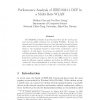Free Online Productivity Tools
i2Speak
i2Symbol
i2OCR
iTex2Img
iWeb2Print
iWeb2Shot
i2Type
iPdf2Split
iPdf2Merge
i2Bopomofo
i2Arabic
i2Style
i2Image
i2PDF
iLatex2Rtf
Sci2ools
IEICET
2007
2007
Performance Analysis of IEEE 802.11 DCF in a Multi-Rate WLAN
The IEEE 802.11 family of specifications is by far the most prominent and successful technique for accessing WLANs. Because the channel used by wireless devices is a time-varying broadcast medium, these devices need to have multi-rate and rate-adaptive capability to adapt to the changing channel so that better performance can be achieved. In this paper, we propose an analytical model, which we call Rate-Adaptive Markov Chains, to study the saturation throughput and delay performance of an 802.11 WLAN in which the mobile hosts have multi-rate support, will use the ARF protocol to adapt rates for different channel qualities, and follow the DCF protocol to contend for data transmissions in a slowly-varying channel. Simulation results are also provided to verify the correctness of the model.
Related Content
| Added | 14 Dec 2010 |
| Updated | 14 Dec 2010 |
| Type | Journal |
| Year | 2007 |
| Where | IEICET |
| Authors | Weikuo Chu, Yu-Chee Tseng |
Comments (0)

